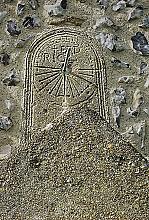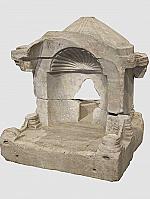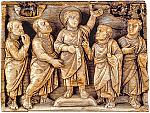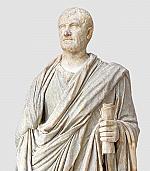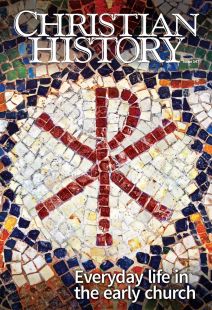Christian History timeline: Everyday life in the early church
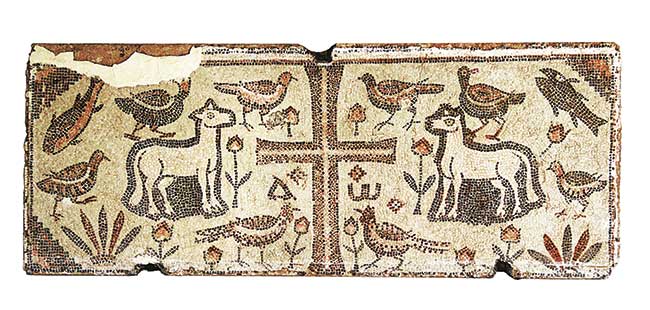
[Roman mosaic containing the Christian cross in the Lamta museum—Habib M’henni / Wikimedia Commons]
—c. 33 The church appoints its first deacons.
—c. 35 Stephen, the church’s first martyr, is killed.
—c. 40 The word “Christians” is first used to describe believers in Antioch.
—c. 46–c. 60 Paul makes his missionary journeys.
—c. 48 Jerusalem Council meets.
—64 The great fire burns Rome. Nero launches persecution of Christians.
—c. 65 Peter and Paul are executed.
—70 Rome besieges and destroys Jerusalem.
—79 Mt. Vesuvius erupts.
—c. 90s Roman emperor is given the title of Dominus et deus (Lord and god).
—c. 100s The Didache, earliest church manual, comes into use.
—c. 106 Roman Empire reaches its greatest extent.
—c. 111 Pliny writes to Emperor Trajan asking how to deal with Christians.
—c. 130–200 An unknown author composes the Epistle to Diognetus.
—140 Justin Martyr founds a school of Christian philosophy at Rome.
—c. 156 Polycarp of Smyrna is martyred.
—161–180 During the reign of Marcus Aurelius, anti-Christian literature proliferates. Around 170 Celsus writes the first full book opposing Christianity.
—165 An epidemic spreads through the empire.
—177 Roman Senate decrees that criminals must face gladiators in the arena.
—c. 190 Clement writes The Instructor.
—Late 100s The Shepherd of Hermas is written.
—c. 197 Tertullian writes To the Martyrs.
— c. 200 Origen writes On Prayer.
—202 Emperor Septimius Severus forbids conversions to Christianity.
—203 Perpetua, Felicity, and their friends are martyred.
—212 Roman citizenship is extended to every freeborn person.
—c. 215 Hippolytus of Rome compiles the Apostolic Tradition, an influential set of guidelines for church practice.
—c. 232 The earliest house church for which we have archaeological evidence begins meeting in Dura Europos.
—c. 250 Another great epidemic occurs. Emperor Decius begins empirewide persecution of Christians. Around this time translation of the Septuagint may have begun.
—c. 250 Plague of Cyprian breaks out.
— 252 Cyprian of Carthage writes On the Lord’s Prayer.
—255–256 African bishops insist on rebaptism of heretics and schismatics; Rome disagrees.
—c. 270 Monasticism begins to spread in Egypt and Syria.
—285 Emperor Diocletian divides the Roman Empire into eastern and western halves. He soon makes other administrative reforms as well as military and economic changes.
—303–304 Diocletian implements the Great Persecution. Edicts call for destruction of church buildings, burning of sacred writings, stripping of Christians’ civil rights, imprisoning of clergy, and for all people to sacrifice to pagan gods on pain of death.
—c. 305 Council of Elvira in Spain sets rules for Christian behavior.
—306–337 Constantine the Great rules as emperor. In 312 he converts to Christianity.
—c. 311 Eusebius of Pamphilius writes Ecclesiastical History.
—313 Edict of Milan legalizes Christianity; Christians compose about 12 percent of the population of the empire.
—318 Athanasius writes On the Incarnation to combat Arianism.
—324 Constantine defeats Licinius to become sole Roman emperor; he chooses Constantinople (formerly Byzantium) as his new capital.
—325 Constantine summons the first Council of Nicaea.
—330 Constantinople is dedicated as capital.
—336 First evidence exists of December 25 celebration of Christ’s birth.
—c. 340 Imperial legislation begins to favor Christianity.
—c. 350 Christians make up half of the empire’s population.
—372 Basil of Caesarea builds his famous hospital.
—380 Theodosius I makes Christianity the official religion of the empire. Around this time Egeria writes about worship in Jerusalem.
—381 Council of Constantinople affirms Nicene orthodoxy.
—393 Theodosius I bans all pagan festivals including the Olympics.
—Late 300s Gregory of Nyssa preaches homilies on the Lord’s Prayer.
—c. 396 John Chrysostom preaches homilies on Ephesians.
—c. 400 Augustine writes “The Good of Marriage.”
By the editors
[Christian History originally published this article in Christian History Issue #147 in 2023]
Next articles
Serving the true Lord and God
Why Christians presented such a huge challenge to the Roman state
George Kalantzis“This superstition”
Pliny, Roman governor of Bithynia in the early second century, asks for advice on how to deal with the Christian movement
PlinySupport us
Christian History Institute (CHI) is a non-profit Pennsylvania corporation founded in 1982. Your donations support the continuation of this ministry
Donate



